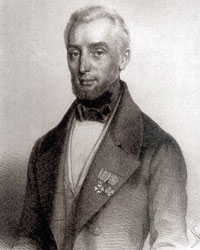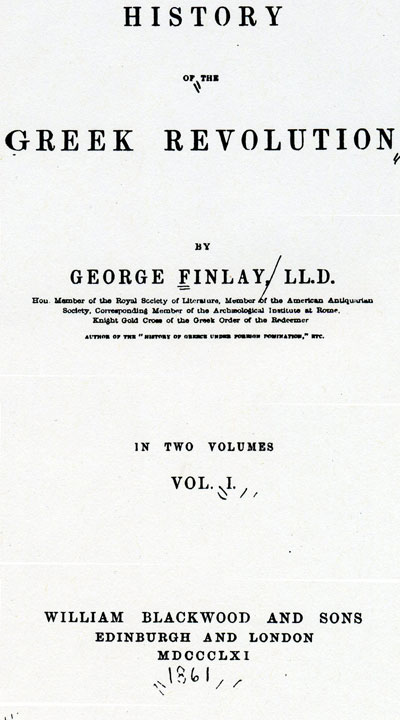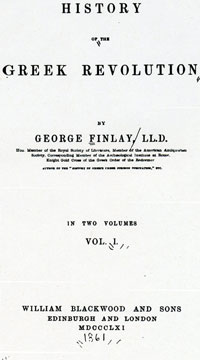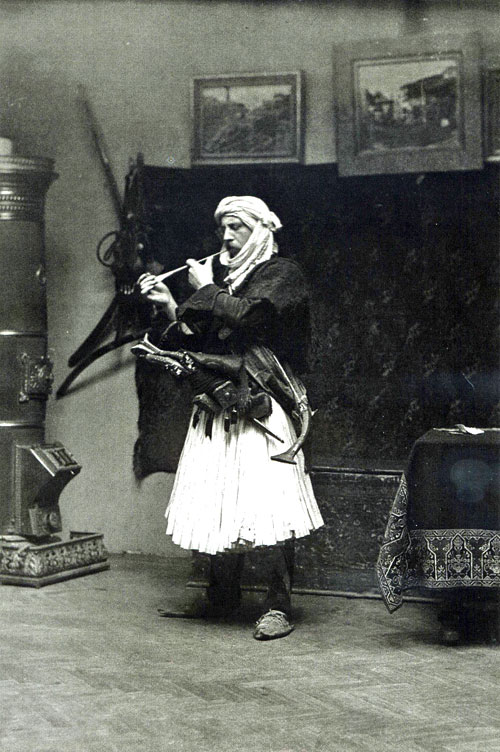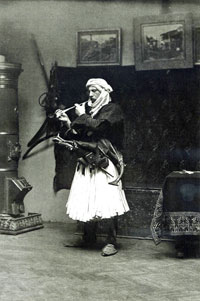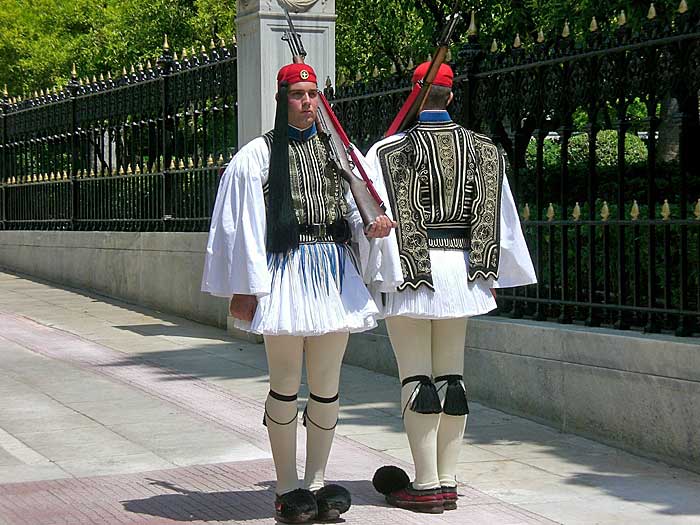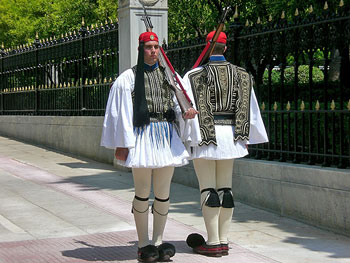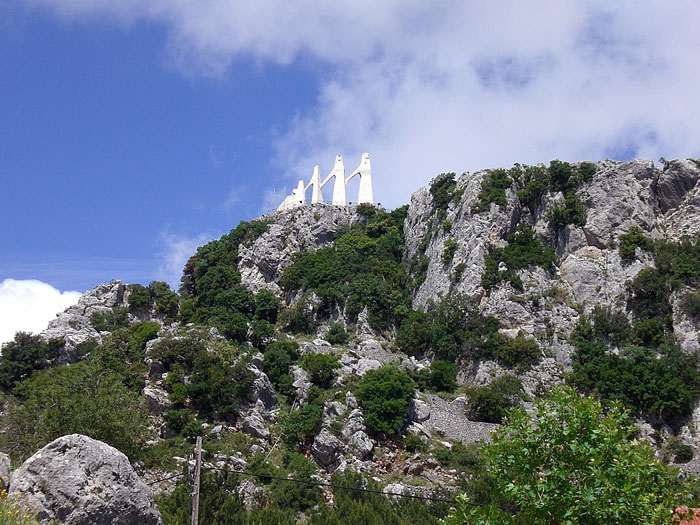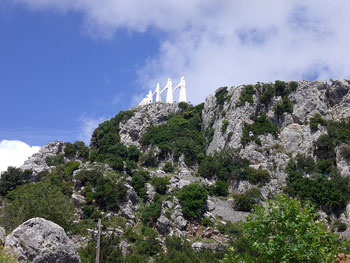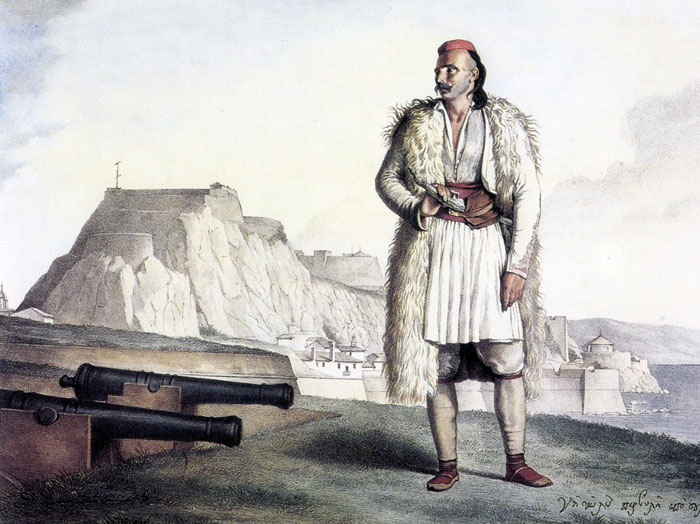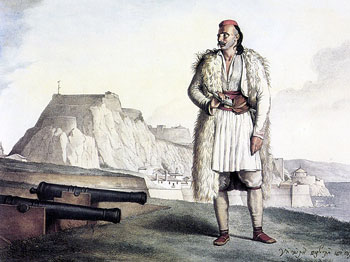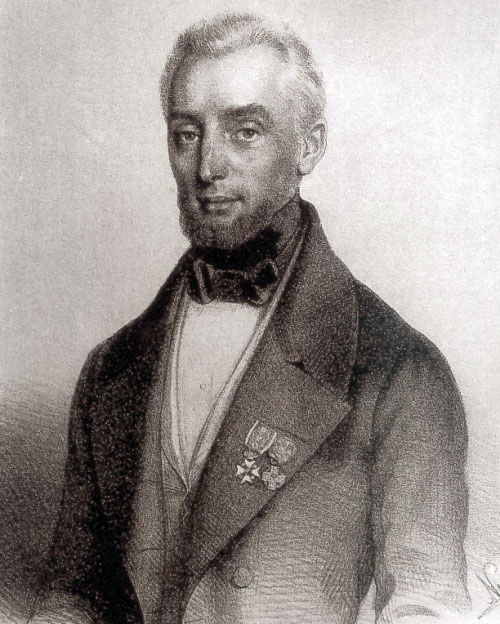| | Robert Elsie | AL Art | AL History | AL Language | AL Literature | AL Photography | Contact | |
Robert Elsie
Texts and Documents of Albanian History
BACK | AL History
1861
George Finlay
The Albanians
George Finlay (1799-1875)Scottish scholar and historian, George Finlay (1799-1875) was an early supporter of Greek independence from the Ottoman Empire and set off for Greece in 1823, where he met Lord Byron in Cephalonia in November of that year. He was a close friend of the British naval officer Frank Abney Hastings (1794-1828) and spent much time sailing with him in Greek waters to follow the course of the uprising. After independence, Finlay bought a country estate in Attica and later lived in Adrianou Street in the (largely Albanian-speaking) Plaka district of Athens where he devoted himself to writing the history of Greece and where he is said to have had a certain influence on Greek politics. Finlay was a productive and influential historian of his period. The culmination of his work is his seven-volume “History of Greece from its Conquest by the Romans to the Present Time” (Oxford 1877). He had a strong influence on German scholars, among whom was Johann Georg von Hahn, with whom he exchanged correspondence. Though the focus of Finlay’s work was the history of Greece in general, he provided much information on the Albanians, especially as they made up a good proportion of the native population of central Greece at the time. In the following excerpt from his “History of the Greek Revolution” (Edinburgh & London 1861), Finlay provides a detailed account of the presence of the Albanians in central Greece in the mid-nineteenth century, of the Albanian origin of the “fustanella,” and of the tragic fate of the Suliot Albanians at the time of Ali Pasha.
The Albanian race occupies no inconsiderable portion of ancient Greece. In the Greek kingdom it numbers about 200,000 souls, chiefly cultivators of the soil, though a part forms the most enterprising maritime population of modern Greece.
Some Albanian colonies settled in Greece before it was conquered by the Othoman Turks; and within the greater part of the limits occupied by the Albanians at the present day, the Greeks have been as completely expelled as the Celtic race in England by the Saxons.
Albanian colonists now occupy all Attica and Megaris, with the exception of the towns of Athens and Megara, where they form only a portion of the population. They possess the greater part of Boeotia and a small portion of Locris, near Talanta. The southern part of Euboea and the northern part of Andros, the whole of Salamis, and a part of Egina, are peopled by Albanians. In the Peloponnesus they are still more numerous. They occupy the whole of Corinthia and Argolis, extending themselves into the northern part of Arcadia and the eastern part of Achaia. In Laconia they inhabit the slopes of Taygetus, called Bardunia, which extend to the plain of Helos, and, crossing the Eurotas, they occupy a large district around Monemvasia to the south of the Tzakonians, and to the north of a small Greek population which dwells near Cape Malea, in the district called Vatika. In the western part of the peninsula they occupied a considerable part of the mountains which extend from Lalla to the northeastern corner of Messenia, south of the Neda. Besides these large settlements, there are some smaller clusters of Albanian villages to the north of Karitena, and in the mountains between the Bay of Navarin and the Gulf of Coron. The islands of Hydra and Spetzas were entirely peopled by Albanians.
The extent of country occupied by the Albanian race is more clearly displayed in a coloured map than by the most minute description. Marathon, Plataea, Leuctra, Salamis, Mantinea, Ira, and Olympia, are now inhabited by Albanians, and not by Greeks. Even in the streets of Athens, though it has been for more than a quarter of a century the capital of a Greek kingdom, the Albanian language is still heard among the children playing in the streets near the temple of Theseus and the arch of Hadrian.
Not more than a tenth of the Albanian population settled in Greece professed the Mohammedan religion. The most warlike tribes were those of Lalla, Bardunia, and Carystos, in Euboea.
The Albanian Mussulmans of Lalla occupied a healthy and agreeable situation in an elevated plain on Mount Phloë. Their scattered habitations formed a great village rather than a town. The principal men dwelt in towers capable of defence. Lalla contained upwards of 3000 inhabitants, and about 400 were well armed and well mounted.
The district of Bardunia took its name from a Byzantine castle, high up on the slope of Taygetus, near the sources of the river Passava. It comprised the south-eastern declivities of the mountain, which run out into a broad ridge overlooking the lower valley of the Eurotas, and extending almost to the sea-coast near Marathonisi. For three centuries this district was possessed by Albanians, who were without any tradition concerning the period at which their ancestors had colonised the country, or embraced Mohammedanism. It may, perhaps, be inferred from this ignorance, that the Barduniots expelled the Sclavonian population, which the Byzantine writers tell us occupied this district at the time of the Turkish conquest, and that they embraced Mohammedanism to become landlords instead of peasants.
The Barduniots dwelt in fortified towers dispersed over the country, and both their situation and their valour enabled them to restrain the forays of the Maniats in the rich plains of Laconia. The exactions of the Barduniot agas were nevertheless often found to be almost as intolerable as the depredations of the Greeks of Mania. The whole population was able to arm about 2500 men. Between forty and fifty families held a superior rank in consequence of their large landed possessions.
Early photo of a northern Albanian
wearing a fustanella.The armatoli were not the only Christians in the Othoman empire who were authorised to bear arms. Several Albanian communities in Greece, though entirely composed of Christians, received this privilege from the sultan. The inhabitants of Megaris, who occupied five large villages, called Dervenokhoria, were particularly favoured by the Porte. The care of guarding the passes over Mounts Cithaeron and Geranion, which lead to the Isthmus of Corinth, was intrusted to them; and they were relieved from several taxes, on the condition that they should furnish a body of armed men constantly on duty. The number of armed men in the five villages amounted to about 2000.
The most influential, though not the most numerous, portion of the Albanian population in Greece, consisted of the shipowners and sailors of Hydra and Spetzas, and of the boatmen of Poros, Kastri and Kranidi.
The island of Hydra contained nearly twenty thousand inhabitants of pure Albanian race before the Greek Revolution. It is a long ridge of limestone rocks, with only a few acres of soil capable of cultivation. The town is situated near the middle of the island, on the channel which separates it from Argolis. Seen from the sea, it presents a noble aspect, forming an amphitheatre of white houses, rising one above the other round a small creek which can hardly be used as a port. The houses cling like swallows’ nests to the sides of a barren mountain, which towers far above them, and whose summit is crowned by a monastery of St. Elias. The streets are narrow, crooked, unpaved lanes, but the smallest dwellings are built of stone, and near the sea some large and solidly-constructed houses give the place an imposing aspect. In these houses the wealthy primates of Hydra resided at the breaking out of the Revolution. They lived, like most Albanians, a frugal, and, it may even be said, a penurious life. In their dress, their education, and their character, indeed, there was very little difference between the primate, the captain, and the common sailor of Hydra. The rich Hydriot usually displayed his wealth in erecting a large building near the sea, which served as a dwelling for his family and a warehouse for his goods. In some of the rooms the sails and cordage of his ships were stored; in others he lived.
The Hydriots of every rank displayed the peculiar character of the Albanian race. They were proud, insolent, turbulent, and greedy of gain. The primates were jealous and exacting, the people rude and violent. But both possessed some sterling virtues; and they were distinguished from the Greeks by their love of truth, and by the honesty with which they fulfilled their engagements. There were no traders in the Levant who paid more punctually than the merchants, and no sailors who took better care of ship and cargo than the mariners of Hydra.
The civil government, conceded by the sultan and protected by the capitan-pasha, was entirely in the hands of the shipowners and retired captains, who formed a class of capitalists. About the year 1730, when the Albanian colony established itself in the then deserted island in order to escape the exactions of the pasha of the Morea, the local administration of the small trading community was intrusted to three elders, called, in the Albanian dialect, plekjeria, who were chosen by the people. The annual tribute paid to the sultan amounted to 200 piastres, a sum at that time not equal to £30 sterling. When the islanders grew richer and more numerous, the number of elders was gradually increased until it reached twelve. But the new settlers never acquired the full rights of the original colonists, and the government became an oligarchy, which indeed appears to be the type to which political society tends among the Albanians. The twelve elders were chosen by the capitalists, and formed a municipal council, divided into three sections composed of four members. Each section acted for four months, and met daily to transact business with the governor or head of the police, who was a primate of the island, named by the capitan-pasha, or commonly called the Bey.
The celebrated capitan-pasha, Kutchuk Hussein, who was a steady protector of the Hydriots and Spetziots, was the first who appointed a governor to act as the sultan’s representative at Hydra. He did so at the request of the Hydriots, who found their municipal authorities unable to restrain the turbulence of rival factions, or to bring murderers to justice.
The family of Konduriottis was one of the most ancient and most distinguished in the island. It was founded by the younger son of an Albanian peasant of the dervenokhorion of Kundura, who settled as a boatman shortly after the expulsion of the Venetians from the Morea, and before Hydra received the colony which formed a regular community. Lazaros Konduriottis was the head of the family during the Greek Revolution. At his marriage his father was assassinated by the bravo of a rival family. Old Konduriottis saw Kolodemo, whom he knew to be an assassin, approaching him covertly during the ceremony. Suspecting his design, he placed a stool before his body, holding it in his hand. The murderer, however, advanced so close that old Konduriottis was forced to hold him at bay with the stool, and endeavour to push him towards the door. Kolodemo was in danger of being baffled, but by stooping down he contrived to stab his enemy with a long knife in the belly, and to escape, leaving the weapon in the wound. The assassination caused the Hydriots to petition the sultan to send a governor with the power of life and death. Kutchuk Hussein named a Hydriot called Bulgaris as the first governor, in the year 1802. Bulgaris had served with the capitan-pasha in the Othoman fleet, as quartermaster of the Christian seamen. The authority of the Christian bey was not, however, sufficient to control the turbulence of his countrymen, and assassination was never completely suppressed.
Hydra paid no direct taxes to the sultan, but it was obliged to furnish a contingent of two hundred and fifty able-bodied seamen to the Othoman fleet, and to pay them from the local treasury. The expense of this contingent amounted to 16,000 dollars annually. Beside this sum, about 4000 dollars were annually expended in presents to the capitan-pasha, to the Greek dragoman of the fleet, and to several officials employed at the admiralty and dockyard at Constantinople. To raise these sums, a tax of five per cent was imposed by the local administration on the gains of every Hydriot, and some custom-duties were levied at the port.
The condition of Spetzas was very similar to that of Hydra. The population was smaller, the proportion of small capitalists was greater, and the local administration was more democratic.
A considerable portion of the coasting trade in the Archipelago was in the hands of the Albanians of Poros, Kastri, and Kranidi, who possessed many decked boats. Over this maritime population the Hydriots and Spetziots exercised supremacy.
Such was the position of the Albanian race in Greece, where its settlements were comparatively modern. In its native regions its political importance and moral influence had been constantly increasing during the latter half of the last century, and it had attained the acme of its power at the commencement of the Greek Revolution. In Albania a considerable proportion of the population had embraced the Mohammedan religion; but the Albanian Mussulmans were detested by Osmanlees and hated by the Greeks. Their religion was hardly a matter of conscience with the majority. They were less bigoted than the Turks, and less superstitious than the Greeks. Their avarice was, however, insatiable, and for gold an Albanian Mussulman would willingly serve a Christian master, or a Christian Albanian a Mussulman chief, even if the service was to be rendered in deeds of blood.
The Albanian forms a distinct race among the nations of Europe. They have been supposed by some to be the representatives of the Pelasgians. They call themselves Shkipetar. Some suppose them to have occupied the regions they now inhabit before the days of Homer, and that they are the lineal descendants of the race to which the ancient Epirots and Macedonians belonged as cognate tribes. Alexander the Great must, according to these archaeologists, have spoken an ancient Albanian dialect at his riotous banquets with his Macedonian officers.
The researches of modern philology have established beyond question that the Albanian language is an early offset from the Sanscrit, and that its grammar was complete at as old a date as the oldest Greek dialect. Nearly the same boundary separates the Hellenic from the non-Hellenic population at the present day as in ancient times. Thucydides calls the Amphilochians who dwelt at the head of the Gulf of Arta barbarians. Strabo says that one race inhabited the whole country, from the Acroceraunian Mountains to the borders of Thessaly and to the plain of Pelagonia, under the name of Epirots or Macedonians, for both spoke the same language.
Ancient Epirus was filled with Greek colonies, and the Greek race is now more numerous than the Albanian in the region immediately to the north of the Gulf of Arta. But, on the other hand, one-fifth of modern Greece is at present inhabited by Albanian colonists. The inhabitants of Albania, of the Shkipetar race, consist of two distinct branches – the Gueghs, who dwell to the north of the valley of the Skumbi and the line of the Via Egnatia. That great artery of Roman life now forms a desolate line of separation between the Gueghs and the Tosks. The dialects of these two branches are said not to differ more in their grammar than the Scotch of Ayrshire and the English of Somersetshire, yet a Guegh and a Tosk are unintelligible to one another at their first meeting. Both branches are subdivided into several tribes. Among the Gueghs several Catholic tribes retain their semi-independence, and uphold the Papal supremacy alike against the Mohammedan Gueghs and their northern neighbours, the fierce orthodox freemen of Montenegro. The Mirdites are considered the most warlike of the Christians. They are all Catholics, and boast that they are the descendants of the companions and soldiers of Skanderbeg.
The Tosks, who dwell to the south of the Skumbi, are the neighbours of the Greeks. The Albanian colonies in Greece are all composed of Tosks. This branch is divided into three great tribes, which are again subdivided into many septs – the Toskides proper, the Lyapides, and the Tchamides. The Toskides are generally Mussulmans, but among the Lyapides and the Tchamides several septs of orthodox Christians retained the privilege of bearing arms, even to the time of Ali of Joannina.
The Albanian aristocracy embraced Mohammedanism in the fifteenth century, but a considerable portion of the people did not apostatise until the end of the seventeenth century. Their conversion was caused by their desire to escape the tribute of Christian children, which compelled them to furnish recruits to the corps of janissaries and to the slaves of the sultan’s household. As among the Greeks, apostacy was common among the higher classes at the time of the first irruptions of the Othomans, and a large proportion of the Albanian chiefs retained their property by changing their religion. Some of the Albanian beys, however, claim descent from the Othoman Turks who accompanied Sultan Bayezid I. and Murad II. in their expeditions, and there can be no doubt that Mohammed II. made some grants of lands and conceded high offices in Albania to several Turks. But, in most cases, the claim to Turkish descent rests only on a tradition that the ancestor of the present bey received a sanjak or some military fief from one of the sultans already mentioned; and, in nine cases out of ten, these grants were the rewards of apostacy, not of previous service. Like the Byzantine nobles at the time of conquest, the morality of the Albanian chiefs was such that they were not likely to become more wicked by becoming Mussulmans. Their change of religion was little more than a change of name and their marriage with three additional wives. The ties of family and tribe existed without modification, and they attest that the chieftains and the people of Albania have a common origin.
The whole of Albania, from the Gulf of Arta to the Lake of Skodra, is divided into innumerable lateral valleys by rugged mountains, which render the communications so difficult as to confine trade to a few lines of transport. The agricultural population is thinly scattered in these valleys, and, as in most parts of Turkey, those who cultivate the soil, even when they are Mussulmans, are considered as forming an inferior grade of society. But there is nothing to prevent the peasant, since he is free, from adopting a military life, and rising to wealth and power. In general, however, the soil is cultivated from generation to generation by the same families, and for centuries it has been cultivated with the same routine. From each yoke of land (zevgari) the landlord receives a rent paid in produce. The peculiarities of Albanian society are most marked in the manner of life among those who are the proprietors of the soil. All of this class consider that they are born to carry arms. The great landlords are captains and leaders. The peasant-proprietors are soldiers or brigands. Landlords, whether large or small, possess flocks, which supply them with milk, cheese, and wool, olive-trees which furnish them with olives and oil, and fruit-trees which enable them to vary their diet. Every landlord who was rich enough to lay up considerable supplies in his storehouses expended them in maintaining as many armed followers as possible, and if his relations were numerous and his phara or clan warlike, he became a chieftain of some political importance. Every Albanian who can avoid working for his livelihood goes constantly armed so that whenever the central authority was weak, bloody feuds were prevalent. And at the commencement of the present century, anarchy appeared to be the normal condition of Albanian society; Gueghs, Tosks, tribes, septs, pharas, towns, and villages, were engaged in unceasing hostilities; open wars were waged, and extensive alliances were formed, in defiance of the power of the pashas and of the authority of the sultan.
Most of the towns were divided into clusters of houses called makhalás, generally separated from one another by ravines. Each makhala was inhabited by a phara, which was a social division resembling a clan, but usually smaller. The warlike habits of the Albanians were displayed even in their town life. Large houses stood apart, surrounded by walled enclosures flanked by small towers. Within these feeble imitations of feudal castles there was always a well-stocked magazine of provisions. Richly caparisoned steeds occupied the court during the day; lean, muscular, and greedy-eyed soldiers, covered with embroidered dresses and ornamented arms, lounged at the gate; and from an open gallery the proprietor watched the movements of his neighbours, smoking his long tchibouk amidst his select friends. The wealthy chieftain lived like his warlike followers. His only luxuries were more splendid arms, finer horses, and a longer pipe. His pride was in a numerous band of well-armed attendants.
The Christian population of Albania diminished from age to age. The anarchy that prevailed during the latter half of the eighteenth century drove many to apostacy and many into exile. Colonies of Albanian Christians had emigrated to the kingdom of Naples in the fifteenth century, and these emigrants were recruited in the sixteenth by numbers who fled from the burden of severe taxation, the exaction of unpaid labour, and the terrible tribute of Christian children. So many Christians sold their property, that the sultans were alarmed at the diminution of the capitation tax, and the difficulty of finding the necessary recruits for the janissaries and the bostangees. This commenced so early, that Suleiman the Magnificent enacted that no Christian proprietor should be allowed to sell his land, if the sale tended to diminish these sources of the Othoman power. If a rayah disposed of his land or ceased to cultivate it, the spahi or timariot of the village was authorised to grant it to another family for cultivation. But no laws can arrest the progress of depopulation, as the history of the Roman empire testifies. Emigration continued, and when emigration was impossible, apostacy increased. At the commencement of the present century even the Greek clergy admitted that Mohammedanism was rapidly extending in parts of Albania which had previously adhered steadfastly to the Christian faith.
The administrative divisions of Albania have varied at different periods of Othoman history, but the positions of Skodra, Berat, and Joannina, have rendered these cities the residence of pashas, to whom the rulers of the districts of Elbassan, Dukadjin, Delvino, and Tchamuria, have generally been subordinate. These three pashaliks have been held by viziers or pashas of the highest rank. Many districts, Mohammedan, Catholic, and orthodox, enjoyed a recognised local semi-independence, protected by the sultan. Any common interest united pharas, makhalás, towns, communities and beys in hostile array against a pasha, and even against the authority of the sultan. But when no danger existed of any external attack on their privileges, local feuds and intestine wars revived as fiercely as ever.
The power and influence of the Albanians steadily increased in the Othoman empire. In the East, the sword alone commands popular respect and political influence. During the last century, as the turbulence of the jannisaries increased and their military value declined, the Albanians rose in consideration and power. In every province of European Turkey the Othoman race seemed to decline, in courage as well as in wealth and number. The Albanians everywhere seized the military power when it escaped from the hands of the Turks. Every pasha enrolled a guard of Albanian mercenaries, in order to intimidate the ayans and Turkish landlords in his pashalik. The tendency of the Othoman government towards centralisation had already commenced, though it still remained almost imperceptible amidst the existing anarchy. The Albanian mercenaries were used as instruments to advance this centralisation; and the power they attained being more apparent than the end for which they were employed, even the Turks, who have always affected military tastes and habits, became imitators of the Albanians. At the commencement of this century, the Greeks from day to day feared the Turks less and the Albanians more.
The history of the Greek Revolution would often be obscure unless the importance of the Albanian element, which pervaded military society in the Othoman empire, is fully appreciated. A trifling, but striking mark of the high position which the Albanians had gained was exhibited by the general adoption of their dress. Though a strong antipathy to the Mussulman Albanians had been always felt by the Othoman Turks, towards the end of the last century they began to pay an involuntary homage to the warlike reputation of the Albanian mercenaries. It became then not uncommon, in Greece and Macedonia, to see the children of the proudest Osmanlees dressed in the fustinello, or white kilt of the Tosks. Subsequently, when Veli Pasha, the second son of Ali of Joannina, governed the Morea, even young Greeks of rank ventured to assume this dress, particularly when travelling, as it afforded them an opportunity of wearing arms. The Greek armatoli and the Christians employed as police-guards, even in the Morea, also wore this dress; but it was the fame of the Albanians – for the military reputation of the armatoli was then on the decline and that of the Suliots on the ascendant – which induced the modern Greeks to adopt the Albanian kilt as their national costume. It is in consequence of this admiration of Albanianism that the court of King Otho assumes its melo-dramatic aspect, and glitters in tawdry tinsel mimicry of the rich and splendid garb which arrested the attention of Childe Harold in the galleries of the palace of Tepelin; but the calico fustinello hangs round the legs of the Greeks like a paper petticoat, while the white kilt of the Tosk, formed of a strong product of native looms, fell in the graceful folds of antique drapery.
The relations of Mussulman and Christian Albanians were much more friendly than the relations of Albanians and Turks. The Albanian, unlike the Greek, felt the bonds of nationality stronger than those of religion. The hostile feelings with which he regarded the Othomans originated in the tyranny of Turkish pashas and the avarice of Turkish voevodes, cadis and moolahs. Against the oppression of these aliens, the natives, whether Mussulmans or Christians, had for many generations acted in common.
On the other hand, where orthodox Albanians and Greeks dwelt together, as in a considerable portion of southern Epirus, their common lot as Christians exposed them to the same exactions, and effaced the distinction of race. The obstinacy of the Albanian and the cunning of the Greek were employed for the same object, and exhibited themselves more as individual peculiarities than as national characteristics.
The power of the Albanians in Greece was greatly increased by the employment of a large body to suppress the insurrection excited by the Russians in 1770. Large bodies of Albanian mercenaries maintained themselves for nine years in a state of merely nominal dependence on the pasha of the province, levying contributions from Turks and Greeks alike, and setting the authority of the sultan at defiance. They were at last defeated near Tripolitza by Hassan Ghazi, the great captain-pasha, and almost exterminated; but fresh bands of Albanians were again poured into the Morea by the sultan during the Russian war of 1787, for it was well known that the Greeks regarded these rapacious mountaineers with far greater terror than Turkish troops.
It was at this time that Ali Pasha became dervendji, and about the same period all the pashas in European Turkey greatly augmented the number of Albanian mercenaries in their service. This demand for Albanian soldiers, which had gone on increasing for at least two generations, gave a considerable impulse to population; and so many of these mercenaries returned to their native villages enriched by foreign service, that a visible improvement took place in the wellbeing of the people about the time Ali was appointed to the pashalik of Joannina.
The policy of Ali Pasha was to centralise all power in his own hands. He followed the place of his predecessors, Suleiman and Kurd, in depressing the armatoli; and he commended a series of measures tending to weaken the influence of the Othoman Turks holding property in those parts of Greece and Macedonia subjected to his authority. His immediate object was to weaken the power of the sultan – its direct result was to improve the position of the Greek race; for much of the authority previously exercised by the Othomans in civil and fiscal business passed into the hands of the Greeks, and not into those of the Mussulman Albanians, whose military authority Ali was constantly extending.
The Turks in Greece and Macedonia were a haughty, ignorant, and lazy race; but as spahis, timariots, or janissaries, they were affiliated with the most influential classes in the Othoman empire, and Ali did not venture to attack them openly. Their pride of race, as well as their personal interests, rendered them the irreconcilable enemies of the independent authority which he desired to establish. He therefore carried on an incessant war against them; but he conducted this warfare as a series of personal affairs. He strove to conceal his general policy, but he spared no secret intrigue to gain his ends, and often resorted to assassination as the speediest and most effectual means. He usually commenced his operations against his enemies by what Bentham calls vituperative personalities; and by imputing bad designs as a proof of bad character, he generally succeeded in fomenting family quarrels, for Turks are childishly credulous. He also encouraged the Greeks to complain of acts of injustice, and then, as the representative of the sultan’s despotism, he judged the accused. If no other means could be found, he accused powerful beys of treasonable conduct, pretending that they held secret communications with the rebel pashas, then proscribed by the Porte; or with bands of klephts, who were as much a domestic institution in his pashalik as they have since been in King Otho’s kingdom. In this way, he rarely failed to obtain a warrant from the sultan sanctioning the execution of his enemy. By pursuing this policy steadily for more than a quarter of a century, most of the Osmanlees in Thessaly were impoverished, and several of the principal families ruined. The towns everywhere showed signs of decay; the best houses in the Turkish quarters were often tenanted by Greek or Vallach traders, or occupied by Albanian officers.
While the wealth and numbers of the Turkish race diminished, Ali took care to invest his own Albanian followers with the military authority he wrung from the hands of the Osmanlees; but the increasing influence of the Albanian race during the early part of the present century was not confined to the increase in the numbers and power of the Mussulman soldiery, nor to the augmentation of the commercial enterprise of the maritime population of Hydra and Spetzas. Several warlike Christian tribes still retained the privileges of bearing arms in Albania. In northern Albania these tribes were Catholic, but in southern Albania they were orthodox; and among the orthodox the Suliots were pre-eminent for their warlike qualities, even among the warlike population by which they were surrounded.
The Suliots were a branch of the Tchamides, one of the three great divisions of the Tosks. The constitution of their community deserves notice. The Suliots inhabited a district consisting of steep ranges of bare and precipitous mountains, overlooking the course of the Acheron; that river, uniting with the Cocytus in its lower course forms a marshy lake and renders the country at its mouth so unhealthy that it was considered the shortest road to the realms beyond the grave. In the immediate vicinity of Suli the mountains afford only a scanty pasture for goats; but when they ascend, broad ridges spread out covered with oaks; and when they rise still higher, their loftier summits protrude in rocky peaks above forests of pine.
The strength of Suli lay in the difficulty of approaching it with a large body of men, and of attacking well-trained riflemen in stone buildings without artillery. The deep and dark ravine of the Acheron renders Suli inaccessible in front. The lair of the Suliots lies imbedded in a later valley covered by two rocky hills, where a confluent joins the black waters of the Acheron. The approach is by a gorge lower down, called Kleisura, which separates the mountain fastnesses from the fertile plains. Under the Byzantine emperors it appears that the rich and well-watered soil of the lower valleys maintained a numerous population. The district was once a bishop’s see, whose cathedral church stood near the entrance of the Kleisura. At present the former population is represented by the Mussulman proprietors of Paramythia and Margariti.
When Sultan Murad II. conquered Joannina, the whole country, to the shores of the Ionian Sea, submitted to Mussulman domination. The territory afterwards occupied by the Suliots was granted as a military fief to a timariot, who resided at Joannina. Christian liberty and Suliot independence were in this district the growth of later years. For centuries the Christians paid haratch and the tribute of their children. The anarchy that prevailed during the victorious campaigns of the Venetians under Morosini, and the cession of the Morea by the treaty of Carlovitz in 1699, compelled many Christians to form armed companies for their protection against lawless bands of brigands. As the orthodox Greeks were at that time generally as little disposed to oppose the sultan’s government as they were to unite with the Catholic Venetians, the pashas of Albania and northern Greece favoured the military ardour of the orthodox communities. Some of the companies of armed Christians, which have been confounded with the ancient armatoli, date only from this period, and the community of the Suliots cannot be traced to an earlier origin.
In the year 1730, the number of Suliot families which enjoyed the privilege of bearing arms was estimated at one hundred. The precise year when the right was officially recognised by the pasha of Joannina is not known. The armed Suliots were the guards of a small Christian district over which they exercised the authority of feudal superiors. Their own property was small, but they formed a military caste, and despised all labour as much as the proudest Mussulman. The soil in the richest portion of their territory was cultivated by peasants, who were of the Greek race. The name of Suliots was reserved for the Albanian warriors, who ruled and protected the agricultural population like the ancient Spartans. The peasants were distinguished by the name of the village in which they dwelt.
Anarchy prevailed in the greater part of southern Albania during the early part of the eighteenth century, and many Christians of the tribe of the Tchamides sought refuge from the Suliot community. Its protection prevented the Mussulman communities in the neighbourhood from encroaching on the rights of any Christians who acknowledged themselves its vassals. But about the middle of the century they extended this protection so far as to become involved in feuds with their Mussulman neighbours. The hostilities which ensued induced the Suliots to recruit their force by admitting every daring and active young Christian of the tribe of the Tchamides to serve in their ranks. If any of these volunteers distinguished himself by this courage, and was fortunate enough to gain booty as well as honour, he was admitted a member of the Suliot community, and allowed to marry a maiden of Suli. In this way the community increased in numbers and in power. It was favoured by the sultan’s government, as a check on the lawless independence of the Mussulman communities of Paramythia and Margariti; and it was supplied with arms and ammunition, and encouraged to defend its independence, by the Venetian governor of Parga and Previsa.
Many attacks were made on Suli by the Mussulman agas of the vicinity, but they were always repulsed with such success that the Suliots gradually acquired the reputation of being the best warriors among the warlike Tosks.
The state of Suli now became an epitome of the state of Albania. The community was divided into pharas. The chiefs of the pharas formed alliances abroad in order to increase their influence at home, and the pharas were sometimes involved in civil broils. The assistance of the principal pharas was often solicited and richly remunerated by the neighbouring Mussulmans in their private feuds. The Suliot leaders, like the other Albanian chiefs of pharas, collected as many armed followers as possible; but their revenues were scanty, and the constitution of the Suliot community was democratic, so that the only way to reward followers was to make successful forays on the lands of those neighbours who refused to purchase immunity from depredation. Like most highlanders who dwell on barren mountains overlooking fertile plains, they levied contributions with unsparing rapacity whenever they could do so with impunity. Depredation they honoured with the name of war, and war they considered to be the only honourable occupation for a true Suliot. The poverty of this territory, which the Suliots held in property, and their numbers, compared with the revenues of the district over which their protection extended, rendered it impossible for them to subsist in idleness without plundering their neighbours.
Greek Evzones wearing a fustanella
(Photo: Robert Elsie, May 2009).When Ali Pasha assumed the government of Joannina, in the year 1788, many complaints were made of the lawless conduct of the Suliots. Shortly before his nomination, they had pushed their forays into the plain of Joannina, and rendered themselves so unpopular that Ali deemed they were not likely to find any allies. In pursuance of his policy of centralising all power in his own hands, he resolved to destroy all the independent communities in his pashalik, whether Mussulman or Christian. Prudence required him to commence with the Christians, and circumstances appeared to favour his operations against the Suliots. But when he attacked them, all their neighbours were alarmed, recent injuries were forgiven, and new alliances were formed. Mussulman beys and the Venetian governors of Parga and Previsa supplied them secretly with aid, and the first attacks of Ali on their territory were repulsed without much difficulty.
The intrigues of Russian agents drew the attention of the sultan to the affairs of Suli in 1792, and Selim III. ordered Ali to renew his attacks on a spot which was now looked on at the Porte as a nest of treason, as well as a nursery of brigandage. Russia having abandoned her orthodox partisans at the peace of Yassi, Ali again attacked the Suliots. Their power was not so great that Suli formed a little republic. Upwards of sixty villages and hamlets, inhabited by Christian peasants, paid tribute to the Suliots. That tribute, it is true, consisted only of a small portion of the produce of the soil. The Suliot territory at this time extended over all the mountain district on both sides of the Acheron, as far as the western bank of the Charadra. But the community of Suliots consisted of only 450 families, divided into nineteen pharas, or unions of families. The military force did not exceed 1500 men. Local disputes were violent among the chiefs of the pharas, and the inextinguishable jealousies of Albanian society had caused the Suliots to divide their habitations into four distinct villages or makhalás, called Kako Suli, Kiapha, Avariko, and Samoneva. The name of Kako Suli recalls that of Kakoilion, in the Odyssey. It was a name of terror in Albania, as well as of hate and evil omen.
The attack of Ali on Suli, in the year 1792, failed completely. His numbers enabled him to force the Kleisura from the south, and to gain temporary possession of Kako Suli by assault. But the troops of the pasha were unable to keep the position they had won, and their loss in the vain attempt was so severe that, in retreating from the village, they abandoned all their advanced positions in the valley. Many beys were deserted by their followers, others quitted Ali’s camp, and the desertion became so general that he himself returned hastily to Joannina. His hostilities lasted only three weeks; but the activity and daring displayed by the Suliots in the incessant skirmishing which they carried on, added greatly to their military reputation. Unfortunately, their confidence in their own powers became from this time so overweening that they pursued a more selfish policy than before. They began to fancy that their alliance was a matter of importance to the Emperor of Russia and the Republic of Venice, and they exercised their authority over the Christians in their territory with increased severity, and plundered their Mussulman neighbours with greater rapacity.
In the meantime, the power of Ali increased steadily. He seized the wealth of many rich agas, he murdered many powerful beys, and he reduced several independent communities to subjections. In the spring of 1798 he gained possession of the territory of one of the Christian communities from which the Albanian regiments in the Neapolitan service had drawn their recruits. Ali surprised Nivitsa, on the coast of Chimara, with the assistance of the French general who commanded at Corfu, in the most treacherous manner; and when he gained possession of the place, he put all the inhabitants to the sword with his usual cruelty. In the autumn of the same year he repaid the French for the criminal concessions they had made to win his favour, by obeying the sultan’s orders, and driving them from their possessions in the south of Epirus. After defeating their forces at Nicopolis, he compelled them to surrender the fortresses of Previsa and Vonitsa.
Ali once more turned his arms against the Suliots, whose intrigues with Russia and France had excited the indignation of the sultan and the alarm of the Mussulman population of southern Albania. He now employed secret treachery as a more effectual means of victory than open hostility. The rivalries and dissensions of the pharas enabled him to gain over several chiefs, who entered his service as mercenary soldiers. He also contrived to seize and retain several members of the Suliot families who opposed his schemes, as hostages, at Joannina. Photo Djavella, the most powerful Suliot, became his partisan; and George Botzaris with all his phara, entered his service, and was employed to guard the lands of the Mussulman and Christian cultivators of the soil, lying between the Suliot territory and the plain of Joannina, from the forays of their countrymen. By this defection the community lost the services of seventy families, and of about a hundred good soldiers.
Hostilities were commenced in 1799. George Botzaris commenced operations by attacking the advanced post of his countrymen at Redovuni with a body of two hundred Christian troops in Ali’s service, but he was completely defeated, and died shortly after. As usual in similar cases of treachery and sudden death, report said that he was poisoned. Report, however, said that most of the deaths in the dominions of Ali Pasha at this time were caused by poison, so that if these reports deserve credit, the trade in deleterious drugs must have formed a flourishing branch of commerce in the pashalik of Joannina.
Suli monument in Zalongo, Epirus
(Photo: Robert Elsie, May 2007).Treason is contagious, and Ali did everything in his power to propagate the contagion. He made high offers to most of the Suliot chiefs, but his faithlessness was too notorious for him to gain many partisans. At last he addressed himself to the whole community. He declared that he was resolved to repress all depredations; and as it was difficult for the Suliots to obtain the means of subsistence in their mountains, he invited them to emigrate to fertile lands which he offered to cede to them. If they refused his offer, he threatened them with implacable hatred, incessant hostilities, and inevitable extermination. To the chiefs of the pharas he made secret offers of money and pensions to those who would quit Suli. His offers were rejected, for it was evident that this object was only to sow dissension among the people, and prevent the chiefs from acting cordially together.
The experience Ali had gained by his defeat in 1792, prevented his making any attempt to storm the stronghold of the Suliots a second time. During 1799 and 1800 he confined his operations to circumscribing the forays of the Suliots, by occupying a number of strong positions, which he fortified with care. In this way he succeeded in shutting them up within narrow limits. The Suliots at this time were unpopular, and neither the Christian cultivators of the soil, nor the Greeks in general, showed much sympathy with their cause. Indeed, many Greek captains of armatoli served against them in the army of Ali.
In the summer of 1801, hunger began to be severely felt at Suli, and numbers of women and children were removed to Parga, from whence they were conveyed to Corfu, which was then occupied by the Russians, by whom they were well received. To prevent further communications with Parga, which was now the only friendly spot in Epirus, the pasha strengthened his posts to the westward; and to deprive the Suliots of all hope of assistance from the orthodox, he induced the Greek clergy to declare against them. Ignatius, the metropolitan of Arta, wrote a circular to his clergy, forbidding the Christians in his diocese affording the Suliots any assistance, under pain of excommunication. Ali himself dictated a letter to the bishop of Paramythia, in the name of his superior, the metropolitan of Joannina, ordering him to employ all his spiritual influence against the Suliots as a predatory and rebellious tribe.
Suli warrior in Corfu,
sketched by Louis Dupré (Paris 1825).The final struggle took place in 1803. The sultan supposed, not without some reason, that Ali connived at the prolongation of the war; for it seemed impossible that the Suliots could have resisted the power of the pasha of Joannina for more than four years, if that power had been vigorously employed. Information having been transmitted to Constantinople that the Suliots had procured considerable supplies of ammunition from French ships, the Porte sent peremptory order to Ali to press the siege of Suli with greater activity. Hitherto the Suliots, attended by their wives, had often passed through the lines of the besieging force during the night, and plundered distant villages. The booty and provisions obtained in these expeditions were carried back by the women, who were accustomed to transport heavy burdens on their shoulders over paths impracticable to mules. New posts and additional vigilance cut off this resource.
The hero of Suli was a priest named Samuel, who had assumed the strange cognomen of “The Last Judgement.” It was said that he was an Albanian from the northern part of the island of Andros; but he appears to have concealed his origin, for a hero in the East must be surrounded with a halo of mystery, though Samuel may have wished to erase from his memory everything connected with the past, in order to devote his soul to the contest with the Mussulmans, which he considered to be his chief duty on earth. He was an enthusiast in his mission; and as he was doing the work of Christ, he cared little for the excommunication of servile Greek bishops. The Suliots, who generally regarded every stranger with suspicion, received Samuel, when he first came among them as a mysterious guest, with respect and awe. At last, in the hour of peril, they elected him, though a priest and a stranger, to be their military chief. Religious fervour was the pervading impulse of his soul. His virtue as a man, his valour as a soldier, his prudence when the interest of the community was concerned, and his utter abnegation of every selfish object, caused him to be generally recognised by the soldiers of all the pharas as the common chief, without any formal election. His personal conduct remained unchanged by the rank accorded to him, and, except in the council and the field, he was still the simply priest. As he never assumed any superiority over the chiefs of the pharas, his influence excited no jealousy.
On the 3rd of September 1803, the troops of Ali gained possession of the village of Kakosuli, in consequence of the treachery of Pylio Gousi, who admitted two hundred Mussulman Albanians into his house and barn during the night. Gousi sold his country for the paltry sum of twelve purses, then equal to about £300 sterling, which was paid to him by Veli Pasha, Ali’s second son, who conducted the siege. The traitor pretended that his object was to obtain the release of his son-in-law, who was retained by Ali as a prisoner at Joannina. He considered affection to his own family an apology for treason to his country, but he took care to receive its price in money. About the same time, another Suliot, named Koutzonika, also deserted the cause of his countrymen. The defence of the Suliot territory was now hopeless.
One of the two hills which cover the approach to the ravine of Suli, called Bira, had been abandoned by the pharas of Zervas two months before the treason of Gousi. Treachery placed the besiegers in possession of Kakosuli and Avariko. The second hill, called Kughni, and the village of Kiapha, were the only strongholds left to the Suliots.
Samuel had charge of the magazines on Kughni, and the position was defended by three hundred families. The men guarded the accessible paths, posted behind low parapets of stone called meteris, and the women carried water and provisions to these intrenchments under the fire of the besiegers, who treated them as combatants. The number of women slain and wounded during the defence of Kughni was consequently proportionably great. The little garrison dug holes in the ground under the shelter of rocks, and these holes, when roofed with pine-trees, thick layers of branches, and well-beaten earth, formed a tolerable protection from the feeble artillery of the pasha’s army.
Ali was extremely anxious to secure the persons of several Suliot chiefs. The indulgence of his revenge was one of his greatest pleasures. He therefore ordered Veli to treat with Photo Djavella, determined, if he could find an opportunity of seizing any of the Suliot chiefs, to violate the treaty which his son might have concluded. A capitulation was signed on the 12th of December 1803, by which the Suliots surrendered Kughni and Kiapha to Veli Pasha and Djavella; Drako and Zerva, with their pharas, were allowed to retire to Parga. Ali in the mean time sent orders to place an ambuscade on the road to Parga, and seize the Suliot chiefs; but the agas of Paramythia, and some of the armatoli in Veli’s army, hearing of the movement, sent secret warning to the Suliots, who, by a rapid march and a sudden change of route at the point of danger, baffled the treacherous designs of the pasha.
Samuel refused to trust any capitulation with Ali or his sons, whom he knew no oath could bind. The fall of Suli seemed to terminate his mission. When the Suliots had quitted the hill of Kughni, he retired into the powder-magazine with a lighted match, declaring that no infidel should ever employ ammunition intrusted to his care against Christians, and he perished in the explosion.
The selfish Suliots who had concluded separate treaties with Ali Pasha – Botzaris, Koutzonika, and Palaska – obtained nothing but disgrace by abandoning their countrymen. They had taken up their residence at Zalongo under a promise of protection, but Ali, as soon as he gained possession of Kiapha, sent a body of troops to attack them by surprise. About one hundred and fifty persons were seized and reduced to the condition of slaves. Twenty-five men were killed defending themselves, and six men and twenty-two women threw themselves over a precipice behind the village, to avoid falling into the hands of their inhuman persecutors. Albanian soldiers, on returning to Joannina, declared that they saw several young women throw their children from the rock, and then spring down themselves. The bodies of four children were found below. Botzaris succeeded in collecting together about two hundred persons, and the resistance he and his companions offered to their assailants enabled this body to escape. The soldiers of Ali were not so bloody-minded as the pasha. After some skirmishing, Botzaris was allowed to retire with the women and children to Parga. But the cruelty of Ali was insatiable. He ordered Suliot families, who were living dispersed in different places, to be murdered; and he sent seventy families, who had surrendered at the commencement of hostilities, and whom he had treated with kindness until Suli capitulated, to inhabit the most unhealthy spots of his pashalik.
The Suliots who escaped to Parga passed over into the Ionian Islands, where they were hospitably received by the Russians. Many entered the Russian service; but when the treaty of Tilsit transferred the possession of the Ionian Islands to France, most of the Suliots passed from the Russian into the French service. Only a few who, like Palaskas, were unpopular for their conduct during the fall of Suli, quitted Corfu with the Russians.
Ali Pasha constructed a strong fort at Kiapha, and converted the church of St Donatos, the patron saint of Suli, into a mosque. A few Mussulman Albanians, from the pasha’s native town of Tepelin, were established as guards of the district instead of the Suliots. The Christian peasants returned to cultivate the soil, and for several years they found the agents of the pasha less exacting and rapacious masters than the proud and needy Suliots.
The only Christian communities in southern Albania which now preserved the right of bearing arms, were the inhabitants of some mountain villages amidst the barren rocks of Chimara.
Such was the position of the orthodox Christians of the Albanian race, in the pashalik of Joannina, when Ali Pasha was declared a rebel by Sultan Mahmud.
[extract from: George Finlay, History of the Greek Revolution, Volume 1 (Edinburgh & London: William Blackwood and Sons, 1861), p. 36-64.]
TOP
